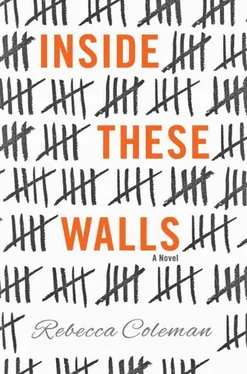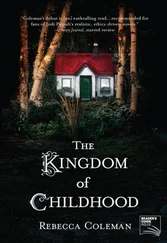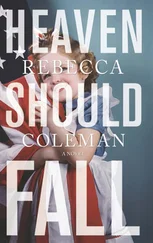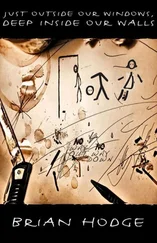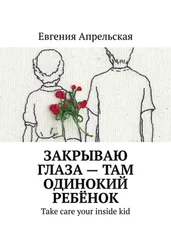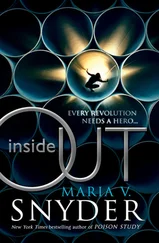One afternoon I walked to the house after work and found Chris and Ricky sitting on the front porch steps. Ricky was smoking a cigarette, which was unusual for him, and when I kissed him I could taste that he had also been smoking marijuana, which was not so unusual. It bears mentioning at this point that I was really no fan of Ricky’s best friend even before the accident in question. Chris had been in the Navy for two years after high school and walked around with this jaded, cocky, pool-hall attitude, as if he’d seen the whole world and considered every human interaction to be a game of poker. He didn’t like black people, and he loved large breasts, and these two items comprised about fifty percent of his efforts at conversation. There was a sort of Batman-and-Robin dynamic to the friendship, and alongside him Ricky took on the role of the beatnik bohemian in a way I felt stifled him. Because of the death of his sister, he had come of age in a family where his grieving parents alternately lavished him with resources and desperate love, then shut themselves away in their mourning. This produced an insecure teenager with a lot of spending money, nearly endless freedom and no respect at all for authority, followed by an adult who was slowly struggling uphill against the obstacles that upbringing had thrown in his path.
Though I was initially attracted to Ricky because he had a free and easygoing spirit that I lacked, over his time with me—and I know this is difficult to believe, given his notoriety now—he had made great strides toward behaving like a responsible adult. He paid his own rent, had stopped mooching off his parents and had turned around some of his red-flag substance use—drinking during the day, the occasional line of cocaine with Chris— that had troubled me early on. In some ways I was very young inside my mind, too, so it was easy to forgive his slow crawl toward respectability. But because Ricky and I felt mutually protective of each other, I believed his friendship with Chris Brooks, which was intensely brotherly on a level approaching the romantic, rewarded him too much for his immaturity.
That afternoon I walked past Ricky and into the house, leaving him on the steps with Chris. Inside was the sort of dark, filthy pigsty one would expect out of two stoned bachelors. The glass bong was out in the living room—that was Ricky’s preferred method of smoking marijuana because he believed the water filtered out the impurities—and some of the cats were nesting in piles of laundry in the downstairs bathroom and at the foot of the stairs. The kitchen sink was sloshed with bong water. An open peanut butter jar, bags of potato chips, a loaf of Wonder Bread spilling from its package and the remainder of a chocolate cake with its frosting roses removed spoke of the feeding frenzy that had followed the boys’ smoking session. The entire place smelled of litter box, weed, and stale tobacco smoke, and the only thing that made it tolerable was the contact high I was achieving merely by standing in it.
Then I noticed a bit of order in the madness, in the form of several sheets of paper arranged on the dining table. This table had no chairs and was overflowing with giant tubs of protein shake powder, ashtrays, one of Liz’s tennis shoes and a general assortment of trash. Yet these papers were arranged neatly and afforded space of their own, so I walked over, tugged the chain for the light—it didn’t turn on, however—and peered down at them. United States District Court, Northern District of California. Alice Myers, Plaintiff, v. Richard Rowan Jr, Defendant . I stepped back outside.
Ricky had finished his cigarette and was sitting with his head in his hands. I rested my arm on his shoulder and played with his hair a little. “That stupid woman just won’t lay off, will she?” I said.
He replied in his Bob Marley voice. “Stupid woman don’t know what life is really worth,” he said. It was a twist on a line from a song.
“Dumb bitch,” Chris said.
You’re the one she ought to be suing , I thought angrily. “It’ll work out,” I assured Ricky. “The court will see you don’t have any money. At worst they’ll garnish your paycheck for a while. And I’ll drive over and pay the electric bill this afternoon. We’ll get the lights back on, at least.”
He nodded, still cradling his head in his hands. “You deserve better than me,” he mumbled.
“This wasn’t your fault,” I said, and it took all the self-control I possessed not to turn to Chris and fire off, It was yours .
“It’s everything,” he said, “everything,” and even in my protectiveness toward his feelings, I couldn’t play dumb. We both knew what my mother thought of him, after all. She had been generous in her attitude toward him for a long time, but now thought Ricky was essentially a bum, and I was anxious for him to stop proving her right.
But after the summons, things only got worse. He went to Father George in the hope of getting extra work to cover the mounting bills, but he and Chris had just put in the fall garden the previous month and Father George claimed to have no additional work for him. This annoyed me as much as it did Ricky, because I felt the man should come up with something for him to do. Ricky was asking for honest work, and God knew—whether or not Ricky did—that Father George could have stood to pay a few pennies on his personal karmic debt by helping out a young man in need. But it was not to be, and twice Ricky came home from the rectory empty-handed.
One evening he and I were sitting beside each other in the plastic chairs of the Laundromat near his house, waiting for his laundry to dry and sketching in our respective sketchbooks. It was what we always did at the Laundromat, and since I was right-handed and he was a lefty, we could sit shoulder to shoulder in a cozy way and still draw without any trouble. Often I drew portraits of whoever was nearby; Ricky typically created stylized, graffiti-like designs, usually of a large-eyed, small child in the midst of a gritty street scene. Our perspectives on art were always quite different—almost opposites, really. I enjoyed drawing portraits of children’s faces, detailed flowers and the like; if my work had a unifying theme, it was to say, See, in spite of everything, the world is filled with beauty . Ricky’s, by contrast, seemed to focus on the strange or unnerving quality of any given thing and exploit it. I agreed with him that art need not be moral, but I never traipsed through the outlands of what that meant, whereas he did nothing else.
On this occasion he had sketched a beach scene, with palm trees framing the water and two children, a boy and a girl, building a sandcastle as a vendor walked by pushing a cart with a picture of two Popsicles on the side. It was an oddly idyllic drawing for Ricky, without any dark subtext that I could see, so I laughed in surprise when I glanced at it. “What’s this?” I asked.
He said, “It’s Cancun. What do you think?”
“Looks nice. We should take a weekend there.”
“Weekend, hell,” he said. “We could drive down there and live on the beach. Sell sand dollars to tourists by day, then make love under the stars.”
“Sounds brilliant,” I said. He had a jokey tone, and I was playing along.
“What do you say to next weekend?”
I laughed and said, “I’ll clear my schedule.”
Then he wrote MARRY ME, KIRA across the sky above the water. He erased KIRA, wrote CLARA instead, and drew a waving banner around it, then a small airplane, as if it were a message trailing behind a biplane. He nudged my shoulder, and I just pushed him back a little harder than he had pushed me. “You need a ring for that, buddy,” I said. I know that seems unromantic, but coming from Ricky this was not very meaningful. He toyed with asking me in these lighthearted ways, and other times he would go into monologues about how silly it was to put love under contract. I think eventually he would have meant it, but at the time I couldn’t take him seriously.
Читать дальше
